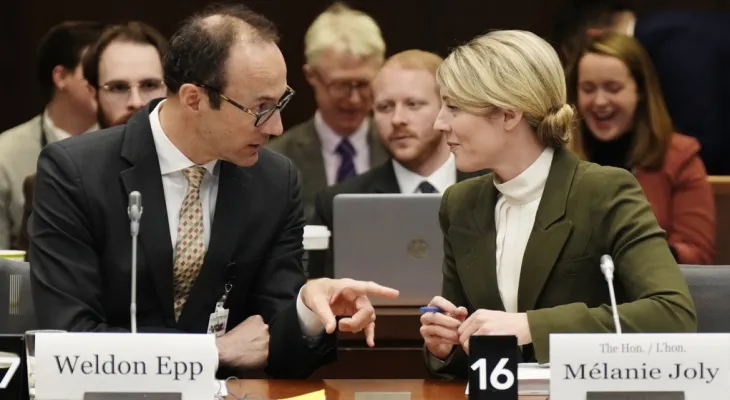Search here
Newspaper
Search here

Arab Canada News
News

Published: February 18, 2024
While experts urge Canada to ease tensions after Prime Minister Justin Trudeau accused India of helping to kill a Canadian, Ottawa is turning to a world of slide shows and charts.
Canadian officials are offering their Indian counterparts a series of "workshops" on the rule of law - at least as Canada sees it - even as tensions escalate over Sikh separatist tendencies.
Senior bureaucrat Weldon Epp told members of Parliament this month: "How India defines extremism or even terrorism is not always taken into account in our legal system."
"The Canadian Department of Justice - and the RCMP in the past - have effectively held workshops with the Indian government, to explain our legal standards.
Last June, Sikh sect leader Hardip Singh Nijjar was shot dead outside his temple in Surrey, British Columbia, and his supporters quickly blamed India.
He was, like some other members of Canada's large Sikh population, an advocate for the creation of a sovereign state called Khalistan.
In September, Trudeau's sudden revelation that Canadian intelligence agencies are "pursuing credible allegations of a possible link" between the Indian government and Nijjar's death.
Since then, Canadian officials have called for better cooperation from their Indian counterparts, who accuse Canada of providing little evidence.
Epp, who oversees Canadian diplomacy in the Indo-Pacific region, testified before a parliamentary committee this month that he will not reveal more until the RCMP is ready to press charges.
In November, U.S. authorities revealed an indictment alleging that an Indian diplomat was involved in a plot to issue an order to assassinate another Sikh separatist. The plot was foiled, but U.S. authorities said they found evidence of plans to assassinate Canadians, including Nijjar.
Epp said Canada has had "long-standing exchanges" with India on counterterrorism concerns, but what New Delhi considers extremism in Khalistan does not always align with Canadian standards.
For example, Canada twice chose not to extradite Nijjar to India in the past decade due to allegations that he was involved in a cinema bombing and an alleged terrorist camp.
Since Trudeau's accusation, India has reduced Canada's diplomatic presence and temporarily stopped processing visas for Canadians, while Canada has halted trade talks. Adding to the tensions, an investigation into foreign interference in Canada listed India as a potential source of interference.
Sushant Singh, a senior researcher at the New Delhi-based Centre for Policy Research, said Indian Prime Minister Narendra Modi is pressing Canada more loudly to take a tough stance against Sikh separatism.
He added, "There is a political and ideological background through which the behavior of the Indian government should be seen and analyzed."
Singh said Modi's inner circle members, including his national security advisor, were shaped by waves of violence between separatist mobs and the Indian government in the 1980s.
In Canada, some temples have venerated people associated with violent acts such as the 1985 Air India bombing.
But Canada insists it will not curb freedom of expression.
Singh said Modi wants to send a message that India cannot be pressured internationally, even as he strengthens his domestic authority through repression of free expression and religious minorities.
Singh added: "He wants to be seen as a strong man," especially ahead of spring elections; it is highly unlikely that he will back down or apologize for what happened in the Nijjar case.
If anything, part of Modi’s Hindu nationalist base supports assassinations beyond territorial borders.
Other Indian diplomats have been accused of behavior inconsistent with international agreements.
In 2020, Germany convicted an Indian diplomat of spying on advocates for Sikh and Kashmiri causes. Similar cases in the U.S. and the U.K. have not led to prosecutions.
Singh said, however, while Canada’s allies point to Trudeau’s allegations as justified, there has been "a significant retreat from India."
New Delhi has shifted from outright denial to saying that extrajudicial killings are not state policy.
He added, "It actually shows that they may be concerned," noting that India may ultimately decide to blame the killing on rogue elements - and if sufficient pressure increases, it points to new checks and balances for intelligence agencies operating abroad.
In this context, Singh said, if Ottawa is offering workshops on the rule of law, it should be seen as an attempt at constructive help rather than an attempt to "embarrass" or "shame" India.
Vijay Sabhani, a fellow at the Macdonald-Laurier Institute, said it is time for both sides to work on restoring diplomatic and trade relations.
He said there are many commonalities between them regarding cooperation on nuclear energy, Commonwealth values, and diaspora relations. The trade opportunities are rich: India values uranium, lentils, and potash from Saskatchewan.
He said, "Canada is the closest to India in the Western world." "The fact that these battles are ongoing now is illogical."
Sabhani said the Liberals took the right tone after the Nijjar case broke by pledging more private diplomatic talks with India. He said public denunciation attempts only drive a wedge.
He said that for real progress, India wants "a long-term solution on the glorification of Khalistani terrorists in Canada" - and the Liberal government to stop hiding behind freedom of expression, as Indian politicians accuse.
Sabhani said political posturing on Sikh issues to attract votes is a tactic of all political parties at all levels of government in Canada.
"What really bothers India is that the level of political and partisan engagement of Canadians on India-related issues is very high."
Sabhani added that the prime minister should avoid unnecessarily angering India, as some of his remarks have harmed Canada's reputation despite their limited impact.
He cited examples such as Trudeau saying his government has more Sikhs than Modi’s, or criticizing the Indian government’s response to farmers' protests.
"I think the biggest challenge Trudeau may face in India is their perception, more than the reality of what is happening."
Comments